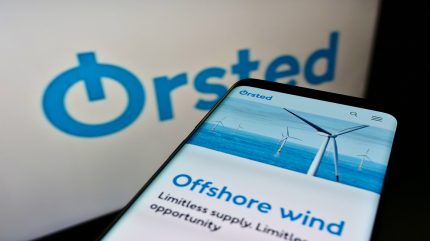
Danish energy company Ørsted has announced a 25% reduction in its investment programme up to 2030, despite the company’s full-year results meeting expectations.
The company attributed the decision to challenges faced in the wider renewable industry, particularly the US offshore wind portfolio, which exerted additional pressure on credit metrics.
Ørsted has reduced the investment from between DKr210bn ($29.1bn) and Dkr230bn for the 2024 to 2030 period, down from the previous target of DKr270bn. It will execute construction projects as planned and carry out its divestment programme.
The company will implement a self-funded business plan to improve credit metric projections. The plan will be financed through operating cash flow, partnerships, divestments, tax equity, and debt and hybrid issuances, with no need for new equity.
For 2025, the company expects earnings before interest, taxation, depreciation and amortisation (EBITDA), excluding new partnerships and cancellation fees, of DKr25 to DKr28bn, and gross investments of DKr50-54bn.
Ørsted expects an increase in EBITDA (excluding new partnerships and cancellation fees) to between DKr29bn and DKr33bn by 2026 and an average return on capital employed (ROCE) of 13% during the same period.

US Tariffs are shifting - will you react or anticipate?
Don’t let policy changes catch you off guard. Stay proactive with real-time data and expert analysis.
By GlobalDataThe previous ambition of the company was to achieve an installed renewable capacity of 35GW to 38GW by 2030 and a targeted EBITDA of between DKr39 and DKr43bn.
Ørsted Group president and CEO Rasmus Errboe stated: “We’ll reduce our investment programme towards 2030 through a stricter, more value-focused approach to capital allocation. We do this to ensure a stronger balance sheet, supporting a solid investment grade rating, and to ensure that we only invest our capital in the most financially attractive opportunities.
“Our number one priority throughout the next three years will be to deliver on our committed 8.4GW offshore wind construction programme, which will almost double our installed offshore wind capacity. The market remains challenging, but delivering on this programme will solidify our position as the undisputed global leader in offshore wind.
In 2024, Ørsted reported an EBITDA excluding new partnerships and cancellation fees of DKr24.8bn. The company commissioned 2.4GW of renewable capacity. 3.5GW of offshore wind capacity was awarded in the UK. It also made the final investment decision on the Baltica 2 offshore wind farm in Poland.
Ørsted also announced that it will prioritise capital allocation to geographies and technologies with the highest value-creation potential and continue its company-wide efficiency programme to drive further cost savings beyond the DKr1bn plan implemented in 2024.
These adjustments will not impact the ongoing construction of 9GW of renewable projects, which will expand Ørsted’s capacity from 18GW to over 27GW.
In a related development, Equinor is scaling back its 2030 renewable energy goals, joining BP and Shell in reducing offshore wind expansion amid a weakening market.
The offshore wind industry faces challenges from rising costs, supply issues, regulatory shifts and low margins, straining investor confidence.



